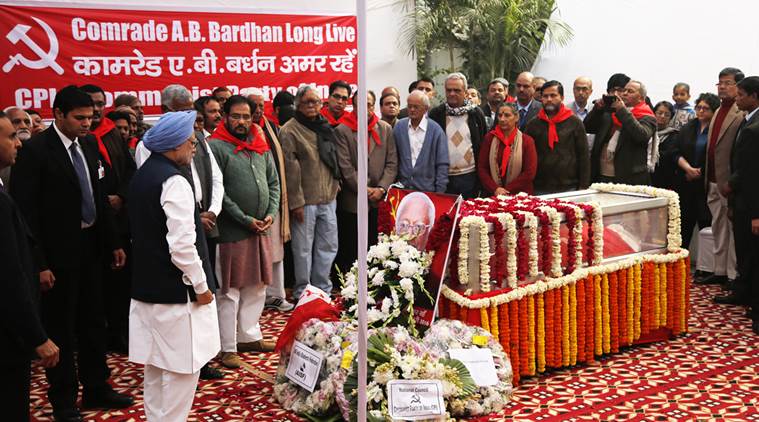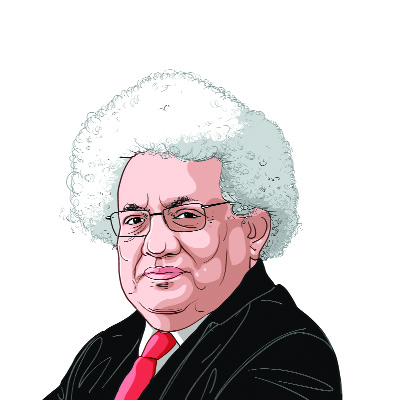Opinion The strange death of Indian Communism
From the Fifties to the Seventies, there was serious debate on how imminent the Communist Revolution was in India.
 Former Prime Minister Manmohan Singh at the last farewell of senior CPI leader AB Bardhan who passed away in the capital New Delhi on saturday. Express Photo by Tashi Tobgyal New Delhi 041216
Former Prime Minister Manmohan Singh at the last farewell of senior CPI leader AB Bardhan who passed away in the capital New Delhi on saturday. Express Photo by Tashi Tobgyal New Delhi 041216  Former Prime Minister Manmohan Singh at the last farewell of veteran CPI leader AB Bardhan who passed away in New Delhi. (Source: Express Photo by Tashi Tobgyal)
Former Prime Minister Manmohan Singh at the last farewell of veteran CPI leader AB Bardhan who passed away in New Delhi. (Source: Express Photo by Tashi Tobgyal)
CPI LEADER leader A B Bardhan’s demise reminded us how little the Left matters today. The Communists are the most honest, decent people in Indian politics. They are also the most irrelevant.
Few can imagine how unlikely this is. From the Fifties to the Seventies, there was serious debate on how imminent the Communist Revolution was in India. The future was red. Now of course no one takes Communists or even Communism seriously. The Soviet Union collapsed without anyone firing a shot. Leninism proved to be a delusion which could not survive the 20th century.
Even so, the reputation was that the Communists were a disciplined party whose members followed the line laid down. They were going to start the Revolution with mass support. Nehru would be exiled like Chiang Kai Shek was.
Why did Communism fail so abysmally? Marx had a fascination with Capitalism and admired its immense productive potential. He and Engels advertised the advent of globalisation in their youthful Communist Manifesto. His ideal of Socialism was timed for well after the maturity of Capitalism.
It was Lenin who changed the argument. He was shocked by the breakdown of working class internationalism in the First World War. He saw the future as dark. He bet that Capitalism would blow itself up due to increasing crises. His lucky victory in Russia established his idea as the Marxism for the Twentieth century.
Communism’s luck continued and Capitalism suffered the Great Depression. It looked like the Revolution was imminent. Lenin had conflated Imperialism and Capitalism. This enhanced the appeal of Communism for the colonies. Stalin consigned millions to concentration camps but the idea that the Soviet Union was the hope of the world remained strong. Victory in the Second World War and then taking over Eastern European countries enhanced the reputation of the Soviet Union. China had its own Revolution which confirmed Lenin’s wisdom that the Communist revolution would start in the backward countries, not developed ones as Marx may have thought. India was supposed to be the next ripe fruit to fall. The CPI had blotted its copybook by supporting the British rulers during the war, as for them the fight was for defence of the Soviet Union. They denounced independence as illusory and launched a premature Revolution in Telangana. Stalin thought India was not ready for a Revolution. So the Communists began to play the democracy game under orders waiting for the signal to revolt.
Alas, they never understood the Indian society and the salience of caste. They romanticised the working class, small as it was, employed in the few large factories. But economic growth stagnated due to distrust of the private sector. India failed to industrialise. The working class remained small.
Then Indira Gandhi cleverly bought out the communists by giving them patronage. The Communists abandoned any critique of the Indian political system and only criticised imperialists. Alas, for them Capitalism proved more robust than Lenin had thought and it revived while Leninism lost the battle of economic power.
The Rao/ Singh government abandoned the failed model of Socialism in 1991 and liberalised the economy which began to grow. Then the Communists challenged Manmohan Singh on the nuclear issue and Congress ‘unfriended’ the Communists. Communism became an irrelevant sideshow. Indian Communism, RIP.




